Language Acquisition of Children: Theories, Stages, and Development
VerifiedAdded on 2020/05/28
|11
|2861
|50
Essay
AI Summary
This essay provides a comprehensive overview of language acquisition in children, exploring various theoretical perspectives. It begins by introducing the concept of language acquisition and its significance in human development. The essay then delves into several key theories, including the behaviorist theory, which emphasizes the role of environmental stimuli and reinforcement; the nativist theory, which posits an innate language acquisition device; the cognitive theory, which links language development to cognitive stages; and the social interactionist theory, which highlights the importance of social interaction and caregiver input. Additionally, the essay examines the speech motor control system in young infants and the development of word segmentation, providing insights into the early stages of language acquisition. It concludes by summarizing the key findings and emphasizing the multifaceted nature of language development, where children learn language by hearing the speech of others and the brain of the child has an underlying structure that aids in the process of acquisition. The interaction with adults plays a great deal in making the child learn the meanings of different words.
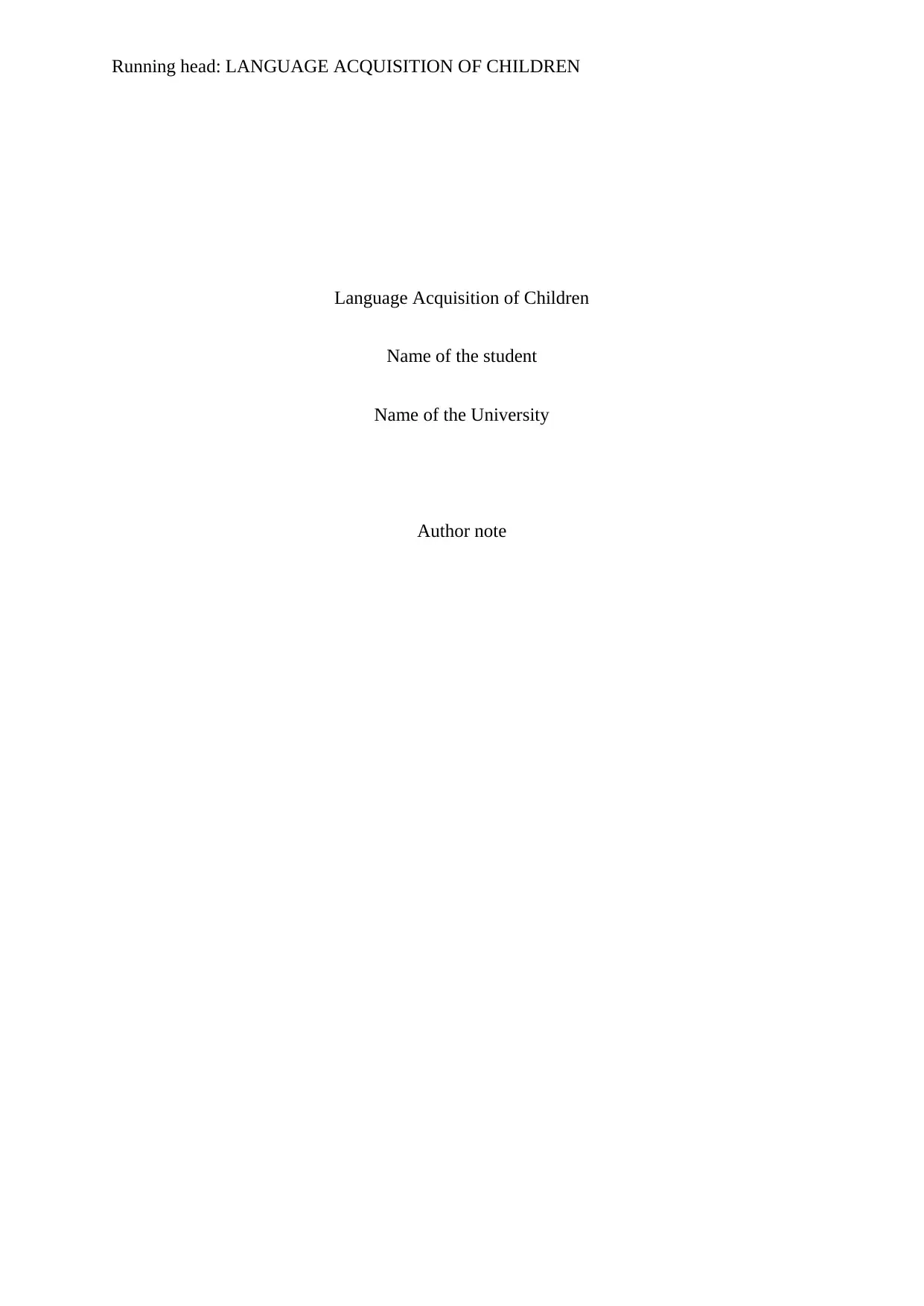
Running head: LANGUAGE ACQUISITION OF CHILDREN
Language Acquisition of Children
Name of the student
Name of the University
Author note
Language Acquisition of Children
Name of the student
Name of the University
Author note
Paraphrase This Document
Need a fresh take? Get an instant paraphrase of this document with our AI Paraphraser
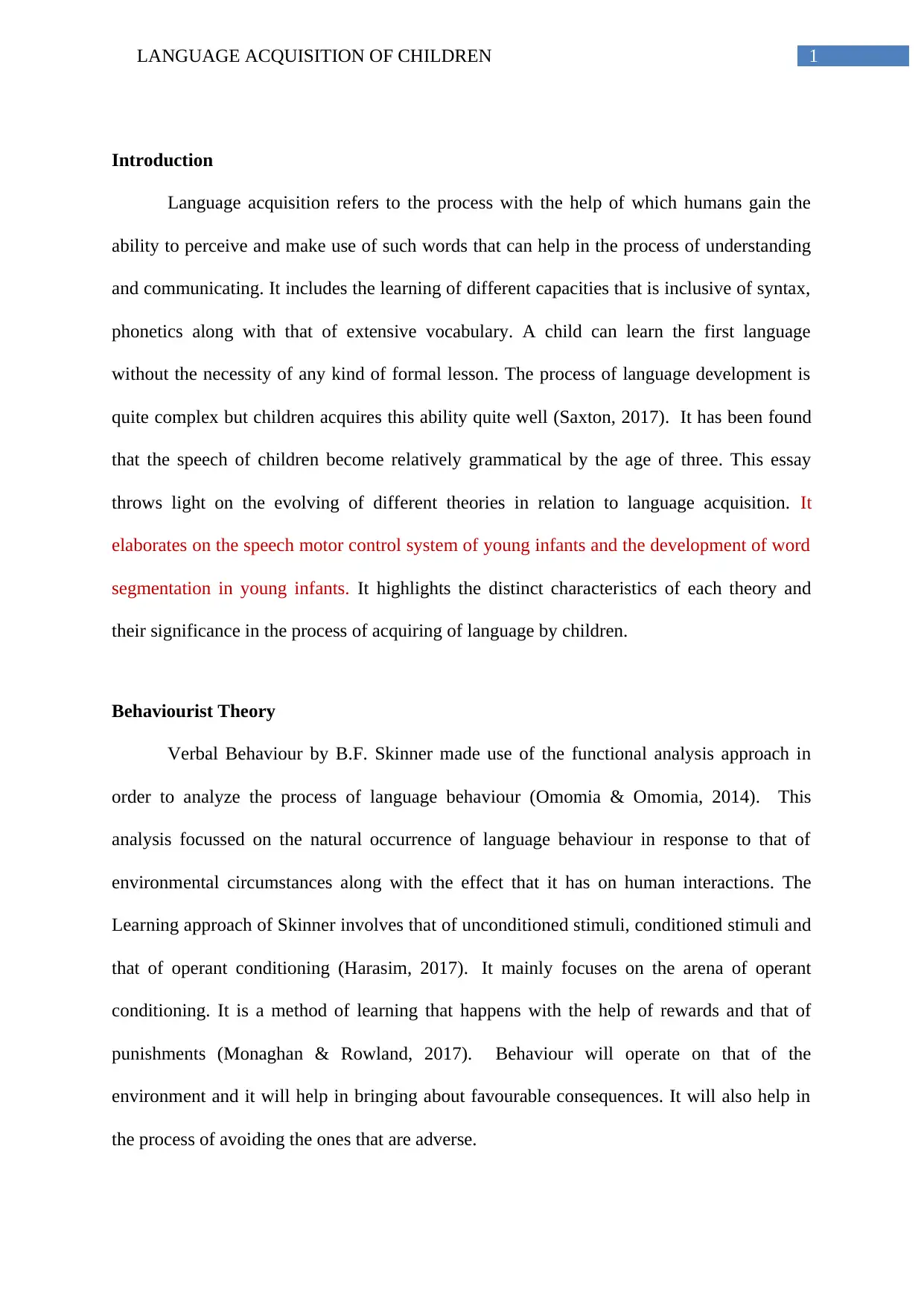
1LANGUAGE ACQUISITION OF CHILDREN
Introduction
Language acquisition refers to the process with the help of which humans gain the
ability to perceive and make use of such words that can help in the process of understanding
and communicating. It includes the learning of different capacities that is inclusive of syntax,
phonetics along with that of extensive vocabulary. A child can learn the first language
without the necessity of any kind of formal lesson. The process of language development is
quite complex but children acquires this ability quite well (Saxton, 2017). It has been found
that the speech of children become relatively grammatical by the age of three. This essay
throws light on the evolving of different theories in relation to language acquisition. It
elaborates on the speech motor control system of young infants and the development of word
segmentation in young infants. It highlights the distinct characteristics of each theory and
their significance in the process of acquiring of language by children.
Behaviourist Theory
Verbal Behaviour by B.F. Skinner made use of the functional analysis approach in
order to analyze the process of language behaviour (Omomia & Omomia, 2014). This
analysis focussed on the natural occurrence of language behaviour in response to that of
environmental circumstances along with the effect that it has on human interactions. The
Learning approach of Skinner involves that of unconditioned stimuli, conditioned stimuli and
that of operant conditioning (Harasim, 2017). It mainly focuses on the arena of operant
conditioning. It is a method of learning that happens with the help of rewards and that of
punishments (Monaghan & Rowland, 2017). Behaviour will operate on that of the
environment and it will help in bringing about favourable consequences. It will also help in
the process of avoiding the ones that are adverse.
Introduction
Language acquisition refers to the process with the help of which humans gain the
ability to perceive and make use of such words that can help in the process of understanding
and communicating. It includes the learning of different capacities that is inclusive of syntax,
phonetics along with that of extensive vocabulary. A child can learn the first language
without the necessity of any kind of formal lesson. The process of language development is
quite complex but children acquires this ability quite well (Saxton, 2017). It has been found
that the speech of children become relatively grammatical by the age of three. This essay
throws light on the evolving of different theories in relation to language acquisition. It
elaborates on the speech motor control system of young infants and the development of word
segmentation in young infants. It highlights the distinct characteristics of each theory and
their significance in the process of acquiring of language by children.
Behaviourist Theory
Verbal Behaviour by B.F. Skinner made use of the functional analysis approach in
order to analyze the process of language behaviour (Omomia & Omomia, 2014). This
analysis focussed on the natural occurrence of language behaviour in response to that of
environmental circumstances along with the effect that it has on human interactions. The
Learning approach of Skinner involves that of unconditioned stimuli, conditioned stimuli and
that of operant conditioning (Harasim, 2017). It mainly focuses on the arena of operant
conditioning. It is a method of learning that happens with the help of rewards and that of
punishments (Monaghan & Rowland, 2017). Behaviour will operate on that of the
environment and it will help in bringing about favourable consequences. It will also help in
the process of avoiding the ones that are adverse.
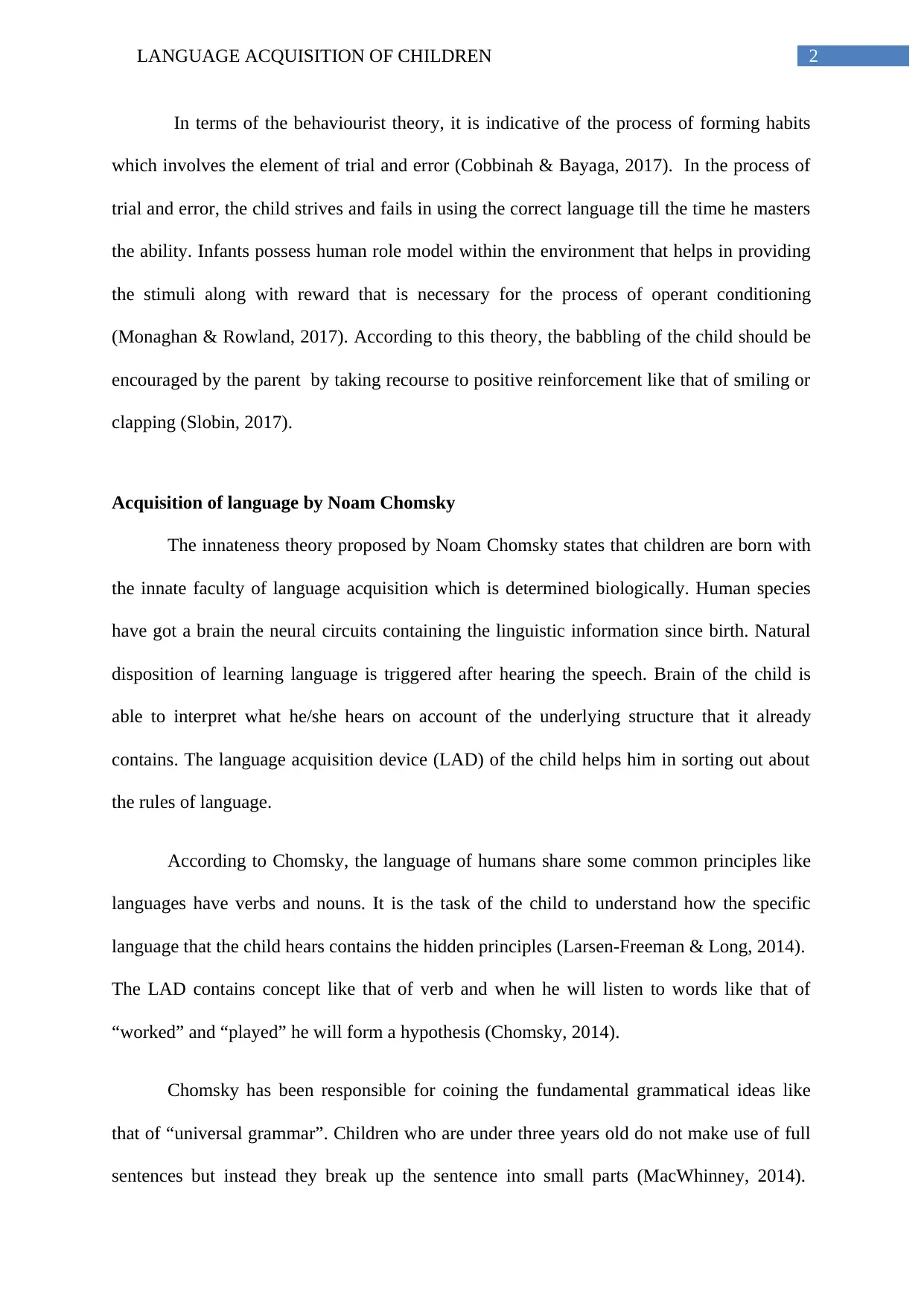
2LANGUAGE ACQUISITION OF CHILDREN
In terms of the behaviourist theory, it is indicative of the process of forming habits
which involves the element of trial and error (Cobbinah & Bayaga, 2017). In the process of
trial and error, the child strives and fails in using the correct language till the time he masters
the ability. Infants possess human role model within the environment that helps in providing
the stimuli along with reward that is necessary for the process of operant conditioning
(Monaghan & Rowland, 2017). According to this theory, the babbling of the child should be
encouraged by the parent by taking recourse to positive reinforcement like that of smiling or
clapping (Slobin, 2017).
Acquisition of language by Noam Chomsky
The innateness theory proposed by Noam Chomsky states that children are born with
the innate faculty of language acquisition which is determined biologically. Human species
have got a brain the neural circuits containing the linguistic information since birth. Natural
disposition of learning language is triggered after hearing the speech. Brain of the child is
able to interpret what he/she hears on account of the underlying structure that it already
contains. The language acquisition device (LAD) of the child helps him in sorting out about
the rules of language.
According to Chomsky, the language of humans share some common principles like
languages have verbs and nouns. It is the task of the child to understand how the specific
language that the child hears contains the hidden principles (Larsen-Freeman & Long, 2014).
The LAD contains concept like that of verb and when he will listen to words like that of
“worked” and “played” he will form a hypothesis (Chomsky, 2014).
Chomsky has been responsible for coining the fundamental grammatical ideas like
that of “universal grammar”. Children who are under three years old do not make use of full
sentences but instead they break up the sentence into small parts (MacWhinney, 2014).
In terms of the behaviourist theory, it is indicative of the process of forming habits
which involves the element of trial and error (Cobbinah & Bayaga, 2017). In the process of
trial and error, the child strives and fails in using the correct language till the time he masters
the ability. Infants possess human role model within the environment that helps in providing
the stimuli along with reward that is necessary for the process of operant conditioning
(Monaghan & Rowland, 2017). According to this theory, the babbling of the child should be
encouraged by the parent by taking recourse to positive reinforcement like that of smiling or
clapping (Slobin, 2017).
Acquisition of language by Noam Chomsky
The innateness theory proposed by Noam Chomsky states that children are born with
the innate faculty of language acquisition which is determined biologically. Human species
have got a brain the neural circuits containing the linguistic information since birth. Natural
disposition of learning language is triggered after hearing the speech. Brain of the child is
able to interpret what he/she hears on account of the underlying structure that it already
contains. The language acquisition device (LAD) of the child helps him in sorting out about
the rules of language.
According to Chomsky, the language of humans share some common principles like
languages have verbs and nouns. It is the task of the child to understand how the specific
language that the child hears contains the hidden principles (Larsen-Freeman & Long, 2014).
The LAD contains concept like that of verb and when he will listen to words like that of
“worked” and “played” he will form a hypothesis (Chomsky, 2014).
Chomsky has been responsible for coining the fundamental grammatical ideas like
that of “universal grammar”. Children who are under three years old do not make use of full
sentences but instead they break up the sentence into small parts (MacWhinney, 2014).
⊘ This is a preview!⊘
Do you want full access?
Subscribe today to unlock all pages.

Trusted by 1+ million students worldwide
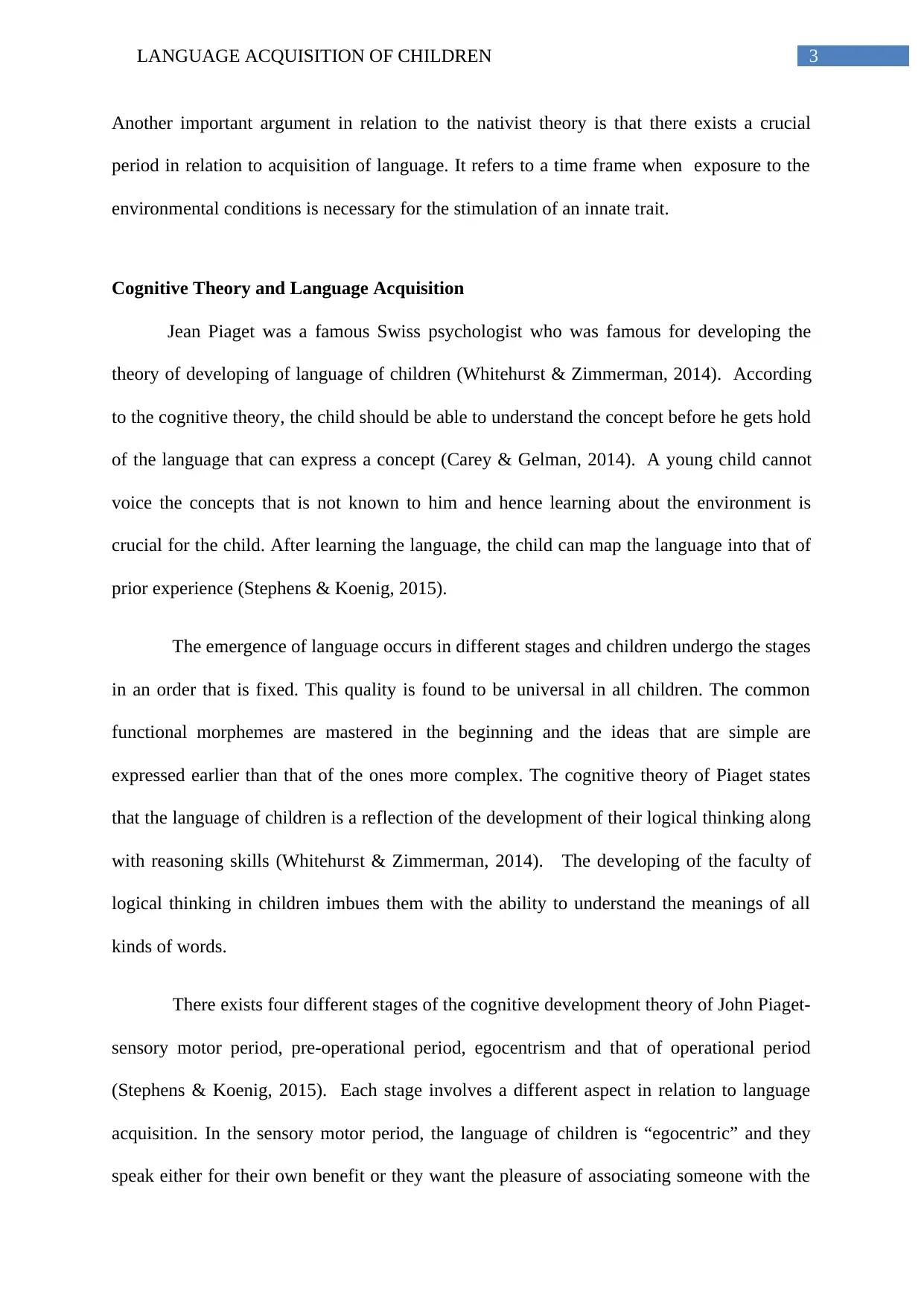
3LANGUAGE ACQUISITION OF CHILDREN
Another important argument in relation to the nativist theory is that there exists a crucial
period in relation to acquisition of language. It refers to a time frame when exposure to the
environmental conditions is necessary for the stimulation of an innate trait.
Cognitive Theory and Language Acquisition
Jean Piaget was a famous Swiss psychologist who was famous for developing the
theory of developing of language of children (Whitehurst & Zimmerman, 2014). According
to the cognitive theory, the child should be able to understand the concept before he gets hold
of the language that can express a concept (Carey & Gelman, 2014). A young child cannot
voice the concepts that is not known to him and hence learning about the environment is
crucial for the child. After learning the language, the child can map the language into that of
prior experience (Stephens & Koenig, 2015).
The emergence of language occurs in different stages and children undergo the stages
in an order that is fixed. This quality is found to be universal in all children. The common
functional morphemes are mastered in the beginning and the ideas that are simple are
expressed earlier than that of the ones more complex. The cognitive theory of Piaget states
that the language of children is a reflection of the development of their logical thinking along
with reasoning skills (Whitehurst & Zimmerman, 2014). The developing of the faculty of
logical thinking in children imbues them with the ability to understand the meanings of all
kinds of words.
There exists four different stages of the cognitive development theory of John Piaget-
sensory motor period, pre-operational period, egocentrism and that of operational period
(Stephens & Koenig, 2015). Each stage involves a different aspect in relation to language
acquisition. In the sensory motor period, the language of children is “egocentric” and they
speak either for their own benefit or they want the pleasure of associating someone with the
Another important argument in relation to the nativist theory is that there exists a crucial
period in relation to acquisition of language. It refers to a time frame when exposure to the
environmental conditions is necessary for the stimulation of an innate trait.
Cognitive Theory and Language Acquisition
Jean Piaget was a famous Swiss psychologist who was famous for developing the
theory of developing of language of children (Whitehurst & Zimmerman, 2014). According
to the cognitive theory, the child should be able to understand the concept before he gets hold
of the language that can express a concept (Carey & Gelman, 2014). A young child cannot
voice the concepts that is not known to him and hence learning about the environment is
crucial for the child. After learning the language, the child can map the language into that of
prior experience (Stephens & Koenig, 2015).
The emergence of language occurs in different stages and children undergo the stages
in an order that is fixed. This quality is found to be universal in all children. The common
functional morphemes are mastered in the beginning and the ideas that are simple are
expressed earlier than that of the ones more complex. The cognitive theory of Piaget states
that the language of children is a reflection of the development of their logical thinking along
with reasoning skills (Whitehurst & Zimmerman, 2014). The developing of the faculty of
logical thinking in children imbues them with the ability to understand the meanings of all
kinds of words.
There exists four different stages of the cognitive development theory of John Piaget-
sensory motor period, pre-operational period, egocentrism and that of operational period
(Stephens & Koenig, 2015). Each stage involves a different aspect in relation to language
acquisition. In the sensory motor period, the language of children is “egocentric” and they
speak either for their own benefit or they want the pleasure of associating someone with the
Paraphrase This Document
Need a fresh take? Get an instant paraphrase of this document with our AI Paraphraser
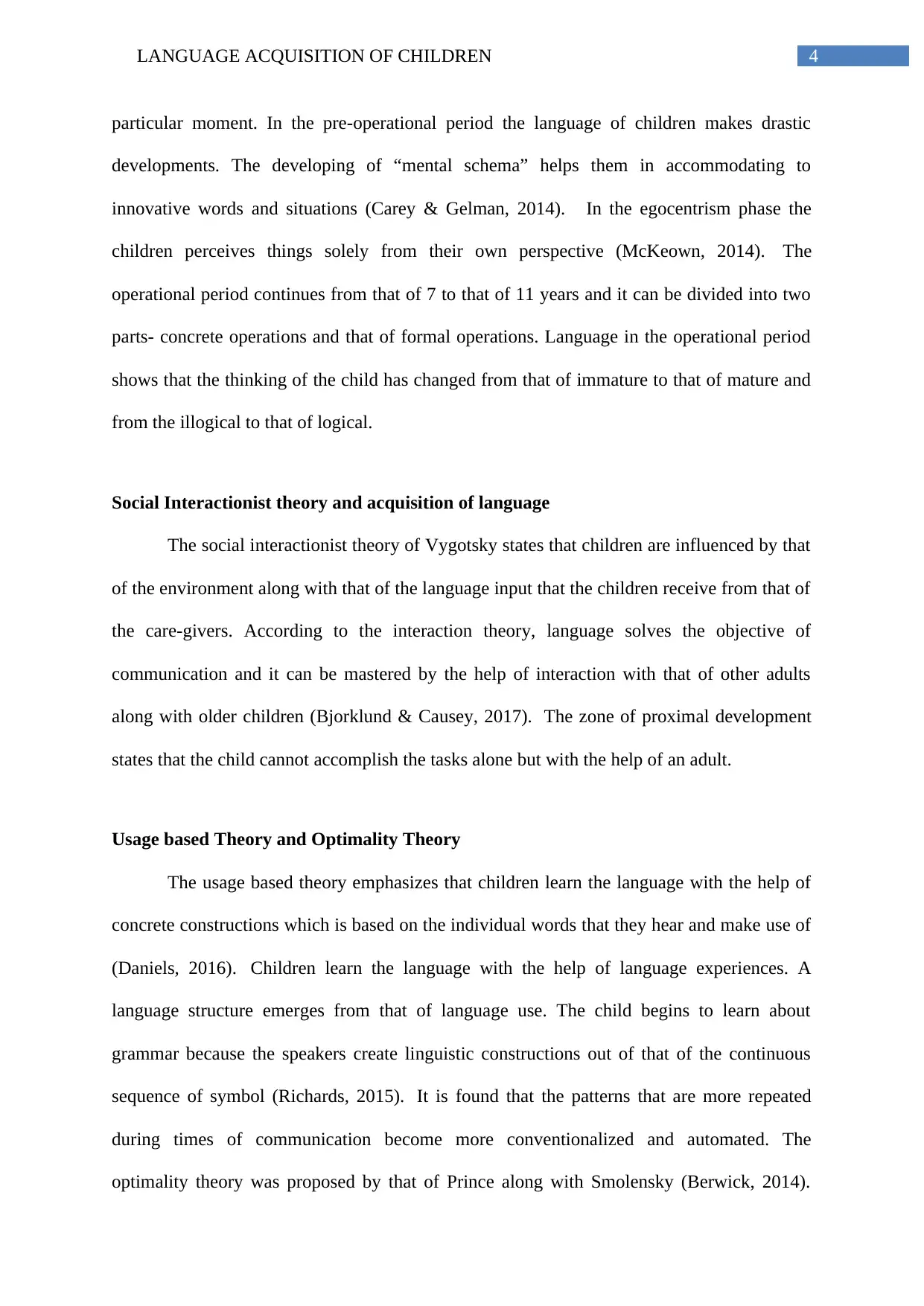
4LANGUAGE ACQUISITION OF CHILDREN
particular moment. In the pre-operational period the language of children makes drastic
developments. The developing of “mental schema” helps them in accommodating to
innovative words and situations (Carey & Gelman, 2014). In the egocentrism phase the
children perceives things solely from their own perspective (McKeown, 2014). The
operational period continues from that of 7 to that of 11 years and it can be divided into two
parts- concrete operations and that of formal operations. Language in the operational period
shows that the thinking of the child has changed from that of immature to that of mature and
from the illogical to that of logical.
Social Interactionist theory and acquisition of language
The social interactionist theory of Vygotsky states that children are influenced by that
of the environment along with that of the language input that the children receive from that of
the care-givers. According to the interaction theory, language solves the objective of
communication and it can be mastered by the help of interaction with that of other adults
along with older children (Bjorklund & Causey, 2017). The zone of proximal development
states that the child cannot accomplish the tasks alone but with the help of an adult.
Usage based Theory and Optimality Theory
The usage based theory emphasizes that children learn the language with the help of
concrete constructions which is based on the individual words that they hear and make use of
(Daniels, 2016). Children learn the language with the help of language experiences. A
language structure emerges from that of language use. The child begins to learn about
grammar because the speakers create linguistic constructions out of that of the continuous
sequence of symbol (Richards, 2015). It is found that the patterns that are more repeated
during times of communication become more conventionalized and automated. The
optimality theory was proposed by that of Prince along with Smolensky (Berwick, 2014).
particular moment. In the pre-operational period the language of children makes drastic
developments. The developing of “mental schema” helps them in accommodating to
innovative words and situations (Carey & Gelman, 2014). In the egocentrism phase the
children perceives things solely from their own perspective (McKeown, 2014). The
operational period continues from that of 7 to that of 11 years and it can be divided into two
parts- concrete operations and that of formal operations. Language in the operational period
shows that the thinking of the child has changed from that of immature to that of mature and
from the illogical to that of logical.
Social Interactionist theory and acquisition of language
The social interactionist theory of Vygotsky states that children are influenced by that
of the environment along with that of the language input that the children receive from that of
the care-givers. According to the interaction theory, language solves the objective of
communication and it can be mastered by the help of interaction with that of other adults
along with older children (Bjorklund & Causey, 2017). The zone of proximal development
states that the child cannot accomplish the tasks alone but with the help of an adult.
Usage based Theory and Optimality Theory
The usage based theory emphasizes that children learn the language with the help of
concrete constructions which is based on the individual words that they hear and make use of
(Daniels, 2016). Children learn the language with the help of language experiences. A
language structure emerges from that of language use. The child begins to learn about
grammar because the speakers create linguistic constructions out of that of the continuous
sequence of symbol (Richards, 2015). It is found that the patterns that are more repeated
during times of communication become more conventionalized and automated. The
optimality theory was proposed by that of Prince along with Smolensky (Berwick, 2014).
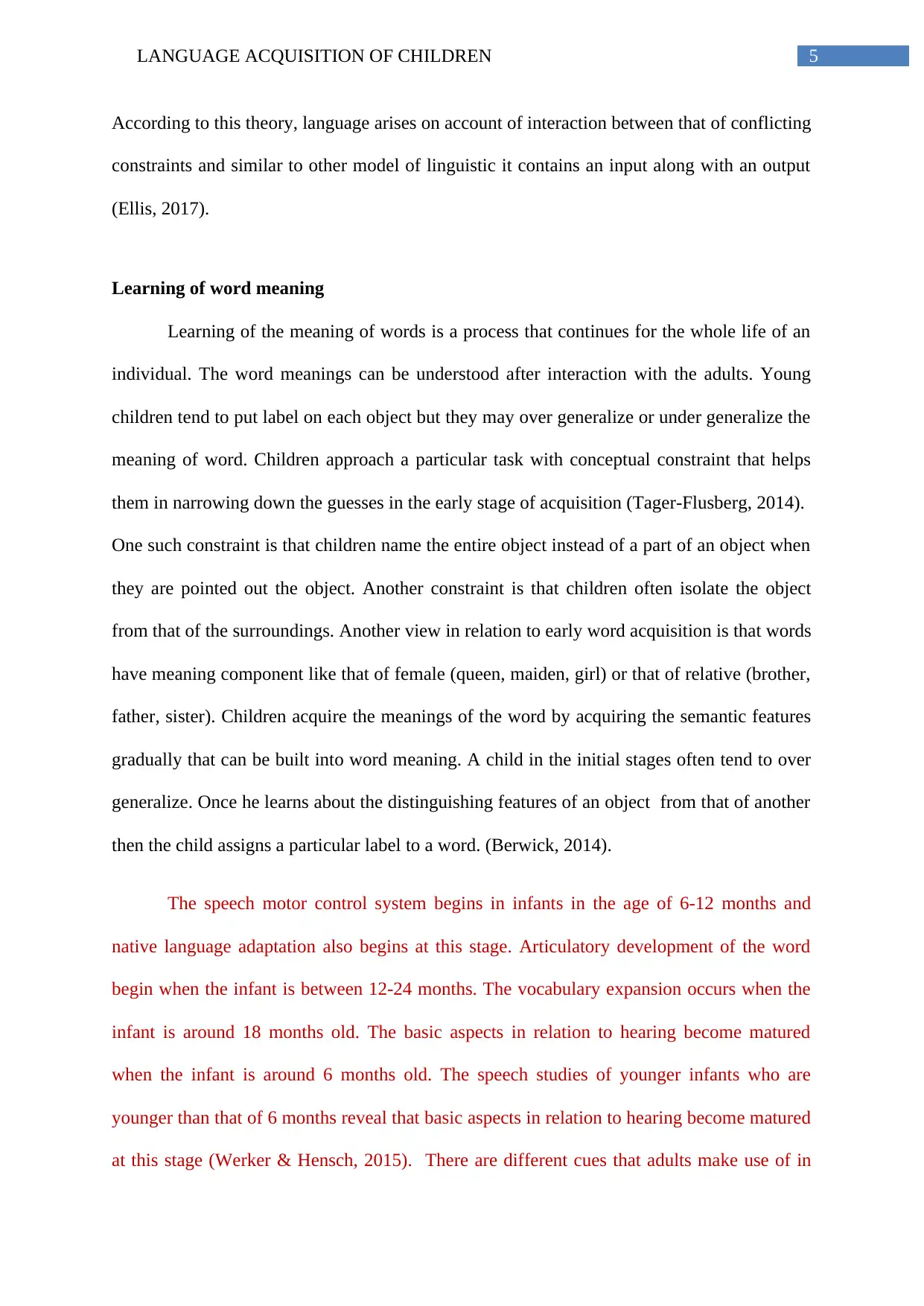
5LANGUAGE ACQUISITION OF CHILDREN
According to this theory, language arises on account of interaction between that of conflicting
constraints and similar to other model of linguistic it contains an input along with an output
(Ellis, 2017).
Learning of word meaning
Learning of the meaning of words is a process that continues for the whole life of an
individual. The word meanings can be understood after interaction with the adults. Young
children tend to put label on each object but they may over generalize or under generalize the
meaning of word. Children approach a particular task with conceptual constraint that helps
them in narrowing down the guesses in the early stage of acquisition (Tager-Flusberg, 2014).
One such constraint is that children name the entire object instead of a part of an object when
they are pointed out the object. Another constraint is that children often isolate the object
from that of the surroundings. Another view in relation to early word acquisition is that words
have meaning component like that of female (queen, maiden, girl) or that of relative (brother,
father, sister). Children acquire the meanings of the word by acquiring the semantic features
gradually that can be built into word meaning. A child in the initial stages often tend to over
generalize. Once he learns about the distinguishing features of an object from that of another
then the child assigns a particular label to a word. (Berwick, 2014).
The speech motor control system begins in infants in the age of 6-12 months and
native language adaptation also begins at this stage. Articulatory development of the word
begin when the infant is between 12-24 months. The vocabulary expansion occurs when the
infant is around 18 months old. The basic aspects in relation to hearing become matured
when the infant is around 6 months old. The speech studies of younger infants who are
younger than that of 6 months reveal that basic aspects in relation to hearing become matured
at this stage (Werker & Hensch, 2015). There are different cues that adults make use of in
According to this theory, language arises on account of interaction between that of conflicting
constraints and similar to other model of linguistic it contains an input along with an output
(Ellis, 2017).
Learning of word meaning
Learning of the meaning of words is a process that continues for the whole life of an
individual. The word meanings can be understood after interaction with the adults. Young
children tend to put label on each object but they may over generalize or under generalize the
meaning of word. Children approach a particular task with conceptual constraint that helps
them in narrowing down the guesses in the early stage of acquisition (Tager-Flusberg, 2014).
One such constraint is that children name the entire object instead of a part of an object when
they are pointed out the object. Another constraint is that children often isolate the object
from that of the surroundings. Another view in relation to early word acquisition is that words
have meaning component like that of female (queen, maiden, girl) or that of relative (brother,
father, sister). Children acquire the meanings of the word by acquiring the semantic features
gradually that can be built into word meaning. A child in the initial stages often tend to over
generalize. Once he learns about the distinguishing features of an object from that of another
then the child assigns a particular label to a word. (Berwick, 2014).
The speech motor control system begins in infants in the age of 6-12 months and
native language adaptation also begins at this stage. Articulatory development of the word
begin when the infant is between 12-24 months. The vocabulary expansion occurs when the
infant is around 18 months old. The basic aspects in relation to hearing become matured
when the infant is around 6 months old. The speech studies of younger infants who are
younger than that of 6 months reveal that basic aspects in relation to hearing become matured
at this stage (Werker & Hensch, 2015). There are different cues that adults make use of in
⊘ This is a preview!⊘
Do you want full access?
Subscribe today to unlock all pages.

Trusted by 1+ million students worldwide
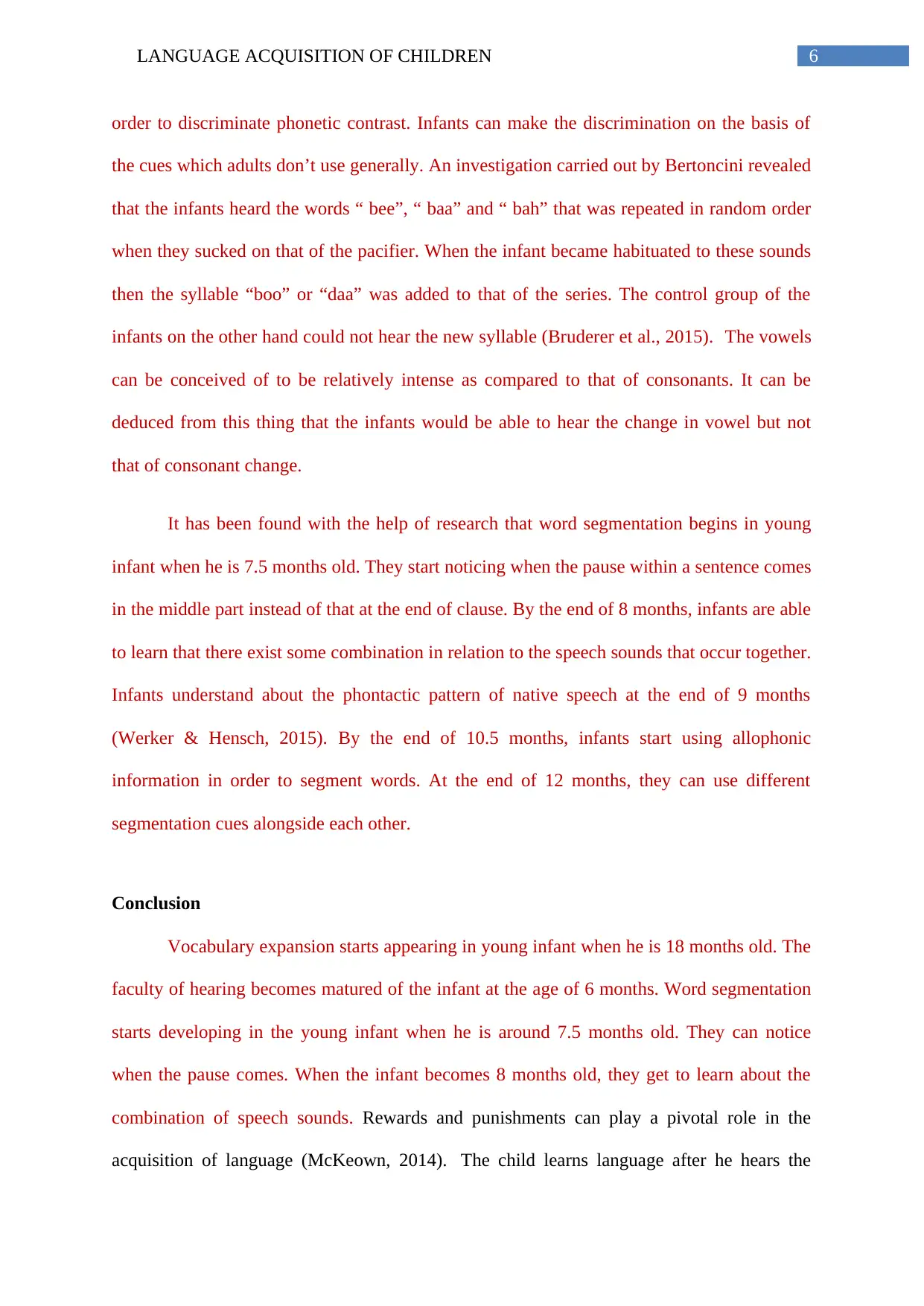
6LANGUAGE ACQUISITION OF CHILDREN
order to discriminate phonetic contrast. Infants can make the discrimination on the basis of
the cues which adults don’t use generally. An investigation carried out by Bertoncini revealed
that the infants heard the words “ bee”, “ baa” and “ bah” that was repeated in random order
when they sucked on that of the pacifier. When the infant became habituated to these sounds
then the syllable “boo” or “daa” was added to that of the series. The control group of the
infants on the other hand could not hear the new syllable (Bruderer et al., 2015). The vowels
can be conceived of to be relatively intense as compared to that of consonants. It can be
deduced from this thing that the infants would be able to hear the change in vowel but not
that of consonant change.
It has been found with the help of research that word segmentation begins in young
infant when he is 7.5 months old. They start noticing when the pause within a sentence comes
in the middle part instead of that at the end of clause. By the end of 8 months, infants are able
to learn that there exist some combination in relation to the speech sounds that occur together.
Infants understand about the phontactic pattern of native speech at the end of 9 months
(Werker & Hensch, 2015). By the end of 10.5 months, infants start using allophonic
information in order to segment words. At the end of 12 months, they can use different
segmentation cues alongside each other.
Conclusion
Vocabulary expansion starts appearing in young infant when he is 18 months old. The
faculty of hearing becomes matured of the infant at the age of 6 months. Word segmentation
starts developing in the young infant when he is around 7.5 months old. They can notice
when the pause comes. When the infant becomes 8 months old, they get to learn about the
combination of speech sounds. Rewards and punishments can play a pivotal role in the
acquisition of language (McKeown, 2014). The child learns language after he hears the
order to discriminate phonetic contrast. Infants can make the discrimination on the basis of
the cues which adults don’t use generally. An investigation carried out by Bertoncini revealed
that the infants heard the words “ bee”, “ baa” and “ bah” that was repeated in random order
when they sucked on that of the pacifier. When the infant became habituated to these sounds
then the syllable “boo” or “daa” was added to that of the series. The control group of the
infants on the other hand could not hear the new syllable (Bruderer et al., 2015). The vowels
can be conceived of to be relatively intense as compared to that of consonants. It can be
deduced from this thing that the infants would be able to hear the change in vowel but not
that of consonant change.
It has been found with the help of research that word segmentation begins in young
infant when he is 7.5 months old. They start noticing when the pause within a sentence comes
in the middle part instead of that at the end of clause. By the end of 8 months, infants are able
to learn that there exist some combination in relation to the speech sounds that occur together.
Infants understand about the phontactic pattern of native speech at the end of 9 months
(Werker & Hensch, 2015). By the end of 10.5 months, infants start using allophonic
information in order to segment words. At the end of 12 months, they can use different
segmentation cues alongside each other.
Conclusion
Vocabulary expansion starts appearing in young infant when he is 18 months old. The
faculty of hearing becomes matured of the infant at the age of 6 months. Word segmentation
starts developing in the young infant when he is around 7.5 months old. They can notice
when the pause comes. When the infant becomes 8 months old, they get to learn about the
combination of speech sounds. Rewards and punishments can play a pivotal role in the
acquisition of language (McKeown, 2014). The child learns language after he hears the
Paraphrase This Document
Need a fresh take? Get an instant paraphrase of this document with our AI Paraphraser
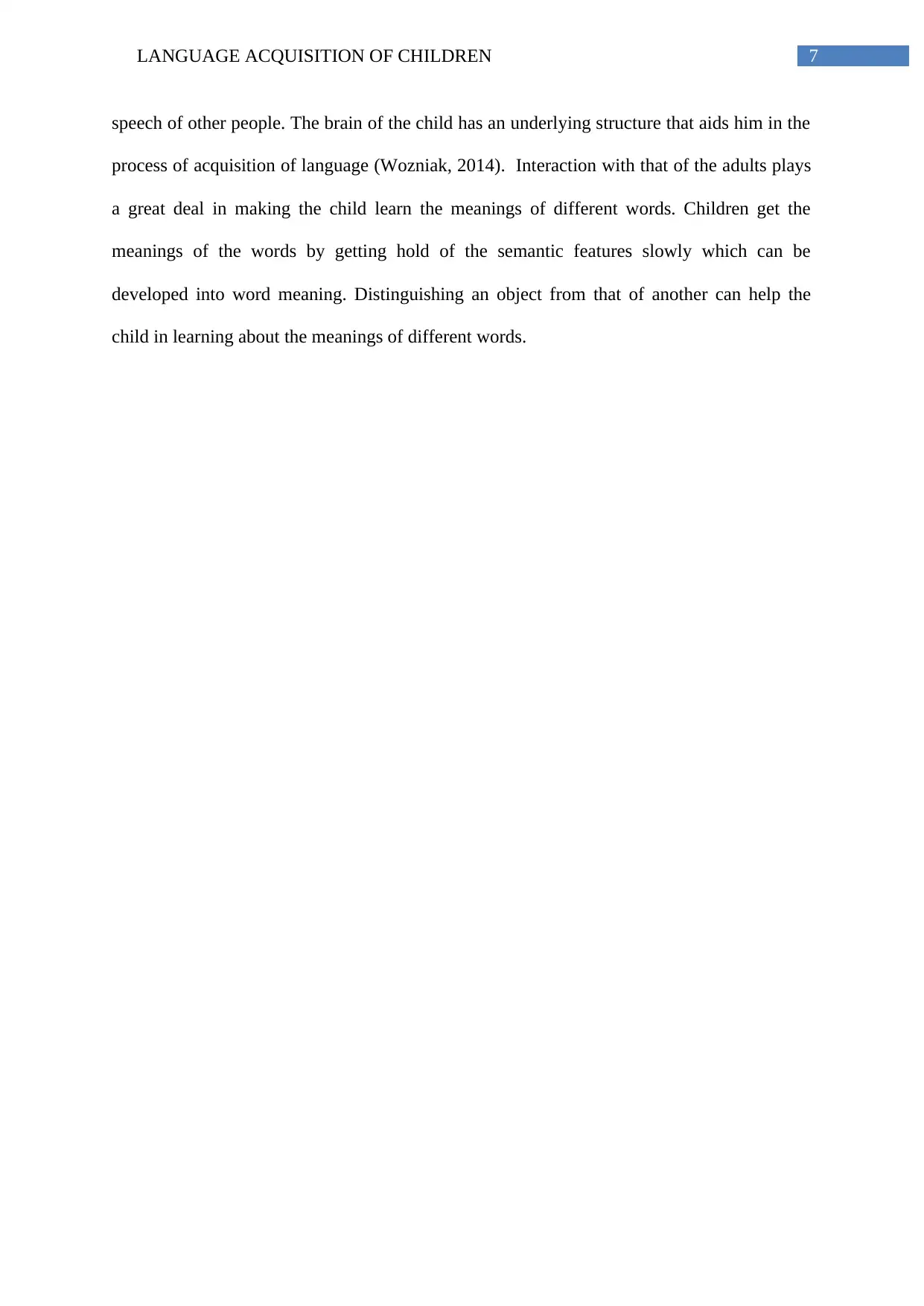
7LANGUAGE ACQUISITION OF CHILDREN
speech of other people. The brain of the child has an underlying structure that aids him in the
process of acquisition of language (Wozniak, 2014). Interaction with that of the adults plays
a great deal in making the child learn the meanings of different words. Children get the
meanings of the words by getting hold of the semantic features slowly which can be
developed into word meaning. Distinguishing an object from that of another can help the
child in learning about the meanings of different words.
speech of other people. The brain of the child has an underlying structure that aids him in the
process of acquisition of language (Wozniak, 2014). Interaction with that of the adults plays
a great deal in making the child learn the meanings of different words. Children get the
meanings of the words by getting hold of the semantic features slowly which can be
developed into word meaning. Distinguishing an object from that of another can help the
child in learning about the meanings of different words.
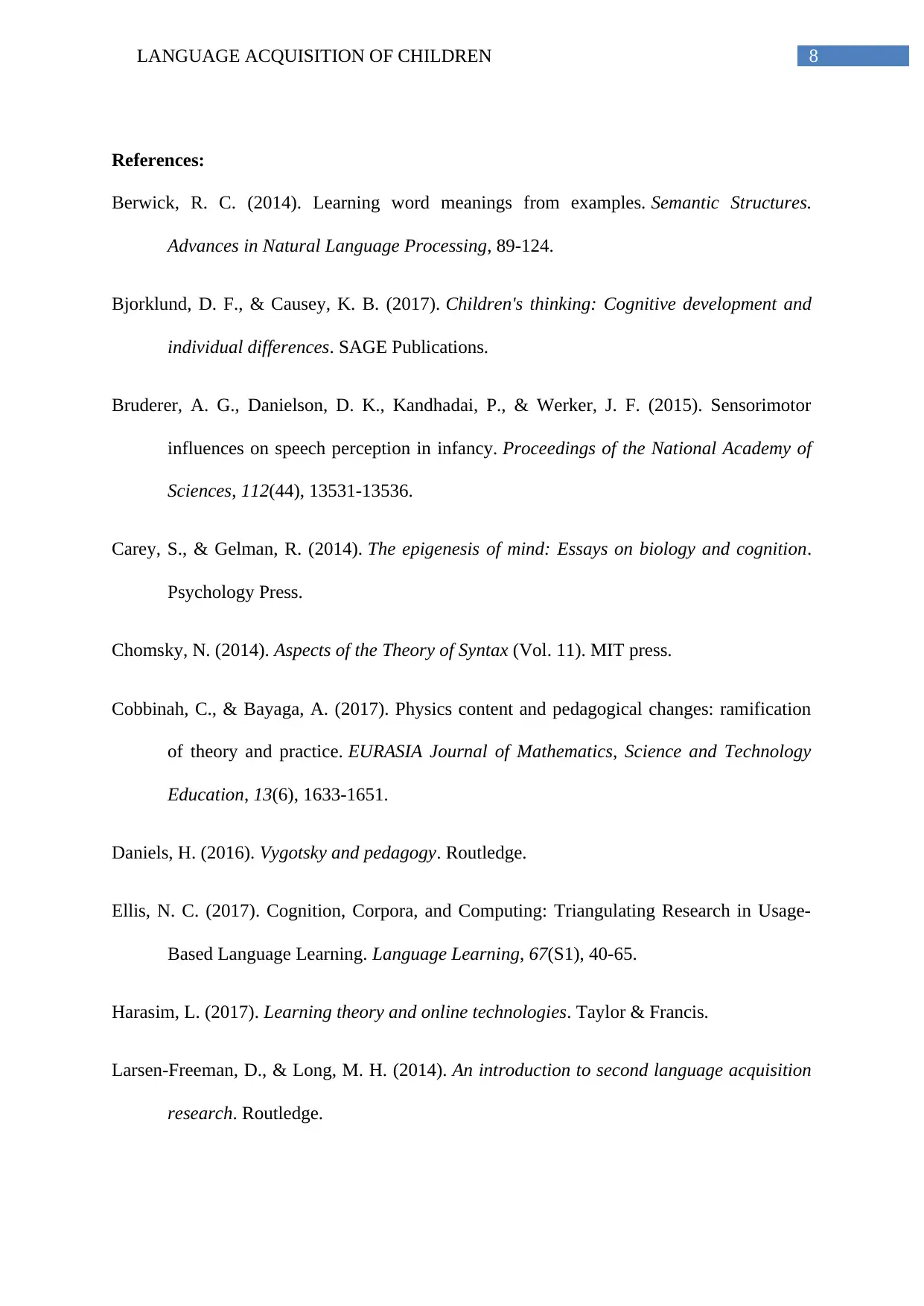
8LANGUAGE ACQUISITION OF CHILDREN
References:
Berwick, R. C. (2014). Learning word meanings from examples. Semantic Structures.
Advances in Natural Language Processing, 89-124.
Bjorklund, D. F., & Causey, K. B. (2017). Children's thinking: Cognitive development and
individual differences. SAGE Publications.
Bruderer, A. G., Danielson, D. K., Kandhadai, P., & Werker, J. F. (2015). Sensorimotor
influences on speech perception in infancy. Proceedings of the National Academy of
Sciences, 112(44), 13531-13536.
Carey, S., & Gelman, R. (2014). The epigenesis of mind: Essays on biology and cognition.
Psychology Press.
Chomsky, N. (2014). Aspects of the Theory of Syntax (Vol. 11). MIT press.
Cobbinah, C., & Bayaga, A. (2017). Physics content and pedagogical changes: ramification
of theory and practice. EURASIA Journal of Mathematics, Science and Technology
Education, 13(6), 1633-1651.
Daniels, H. (2016). Vygotsky and pedagogy. Routledge.
Ellis, N. C. (2017). Cognition, Corpora, and Computing: Triangulating Research in Usage‐
Based Language Learning. Language Learning, 67(S1), 40-65.
Harasim, L. (2017). Learning theory and online technologies. Taylor & Francis.
Larsen-Freeman, D., & Long, M. H. (2014). An introduction to second language acquisition
research. Routledge.
References:
Berwick, R. C. (2014). Learning word meanings from examples. Semantic Structures.
Advances in Natural Language Processing, 89-124.
Bjorklund, D. F., & Causey, K. B. (2017). Children's thinking: Cognitive development and
individual differences. SAGE Publications.
Bruderer, A. G., Danielson, D. K., Kandhadai, P., & Werker, J. F. (2015). Sensorimotor
influences on speech perception in infancy. Proceedings of the National Academy of
Sciences, 112(44), 13531-13536.
Carey, S., & Gelman, R. (2014). The epigenesis of mind: Essays on biology and cognition.
Psychology Press.
Chomsky, N. (2014). Aspects of the Theory of Syntax (Vol. 11). MIT press.
Cobbinah, C., & Bayaga, A. (2017). Physics content and pedagogical changes: ramification
of theory and practice. EURASIA Journal of Mathematics, Science and Technology
Education, 13(6), 1633-1651.
Daniels, H. (2016). Vygotsky and pedagogy. Routledge.
Ellis, N. C. (2017). Cognition, Corpora, and Computing: Triangulating Research in Usage‐
Based Language Learning. Language Learning, 67(S1), 40-65.
Harasim, L. (2017). Learning theory and online technologies. Taylor & Francis.
Larsen-Freeman, D., & Long, M. H. (2014). An introduction to second language acquisition
research. Routledge.
⊘ This is a preview!⊘
Do you want full access?
Subscribe today to unlock all pages.

Trusted by 1+ million students worldwide
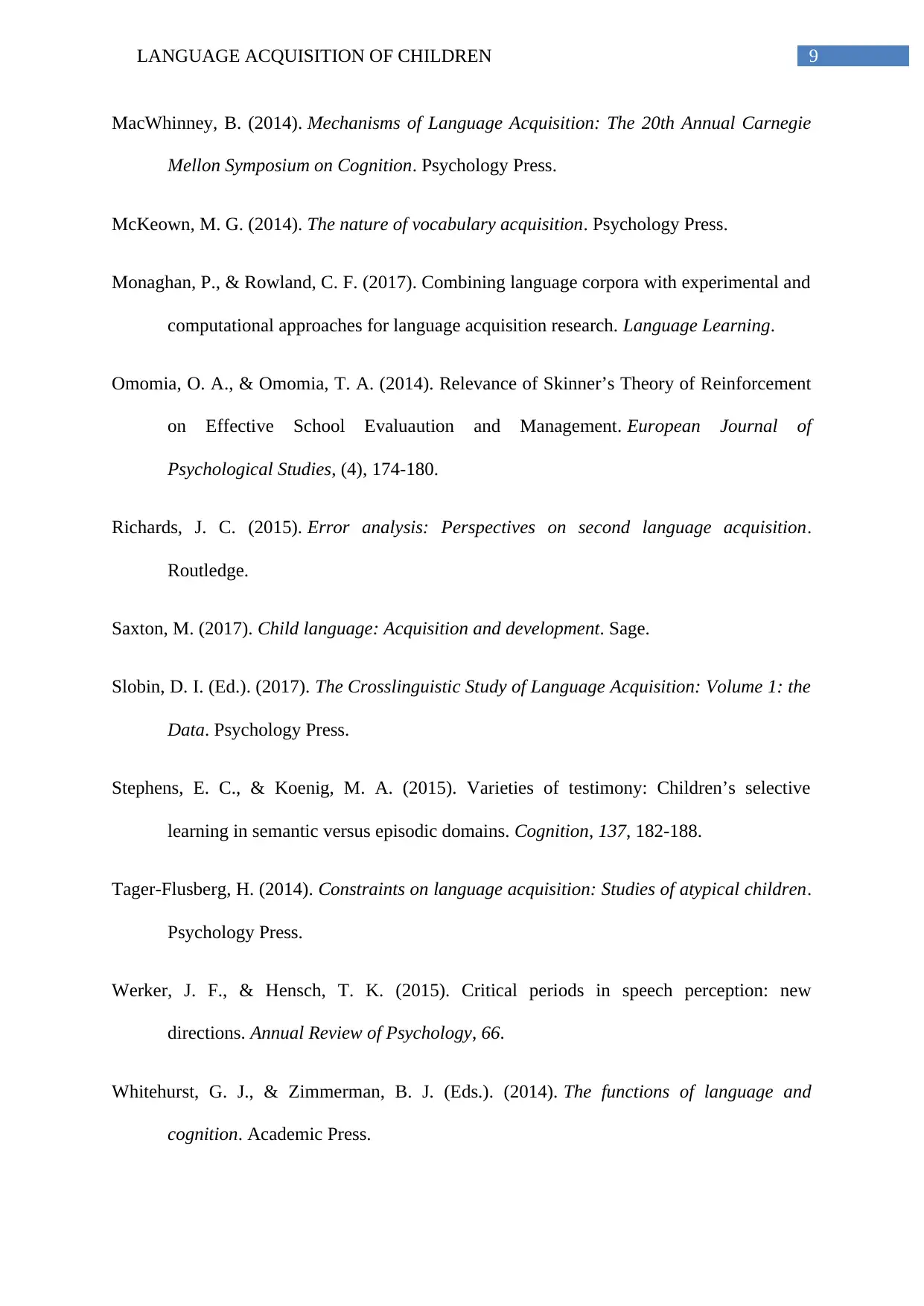
9LANGUAGE ACQUISITION OF CHILDREN
MacWhinney, B. (2014). Mechanisms of Language Acquisition: The 20th Annual Carnegie
Mellon Symposium on Cognition. Psychology Press.
McKeown, M. G. (2014). The nature of vocabulary acquisition. Psychology Press.
Monaghan, P., & Rowland, C. F. (2017). Combining language corpora with experimental and
computational approaches for language acquisition research. Language Learning.
Omomia, O. A., & Omomia, T. A. (2014). Relevance of Skinner’s Theory of Reinforcement
on Effective School Evaluaution and Management. European Journal of
Psychological Studies, (4), 174-180.
Richards, J. C. (2015). Error analysis: Perspectives on second language acquisition.
Routledge.
Saxton, M. (2017). Child language: Acquisition and development. Sage.
Slobin, D. I. (Ed.). (2017). The Crosslinguistic Study of Language Acquisition: Volume 1: the
Data. Psychology Press.
Stephens, E. C., & Koenig, M. A. (2015). Varieties of testimony: Children’s selective
learning in semantic versus episodic domains. Cognition, 137, 182-188.
Tager-Flusberg, H. (2014). Constraints on language acquisition: Studies of atypical children.
Psychology Press.
Werker, J. F., & Hensch, T. K. (2015). Critical periods in speech perception: new
directions. Annual Review of Psychology, 66.
Whitehurst, G. J., & Zimmerman, B. J. (Eds.). (2014). The functions of language and
cognition. Academic Press.
MacWhinney, B. (2014). Mechanisms of Language Acquisition: The 20th Annual Carnegie
Mellon Symposium on Cognition. Psychology Press.
McKeown, M. G. (2014). The nature of vocabulary acquisition. Psychology Press.
Monaghan, P., & Rowland, C. F. (2017). Combining language corpora with experimental and
computational approaches for language acquisition research. Language Learning.
Omomia, O. A., & Omomia, T. A. (2014). Relevance of Skinner’s Theory of Reinforcement
on Effective School Evaluaution and Management. European Journal of
Psychological Studies, (4), 174-180.
Richards, J. C. (2015). Error analysis: Perspectives on second language acquisition.
Routledge.
Saxton, M. (2017). Child language: Acquisition and development. Sage.
Slobin, D. I. (Ed.). (2017). The Crosslinguistic Study of Language Acquisition: Volume 1: the
Data. Psychology Press.
Stephens, E. C., & Koenig, M. A. (2015). Varieties of testimony: Children’s selective
learning in semantic versus episodic domains. Cognition, 137, 182-188.
Tager-Flusberg, H. (2014). Constraints on language acquisition: Studies of atypical children.
Psychology Press.
Werker, J. F., & Hensch, T. K. (2015). Critical periods in speech perception: new
directions. Annual Review of Psychology, 66.
Whitehurst, G. J., & Zimmerman, B. J. (Eds.). (2014). The functions of language and
cognition. Academic Press.
Paraphrase This Document
Need a fresh take? Get an instant paraphrase of this document with our AI Paraphraser
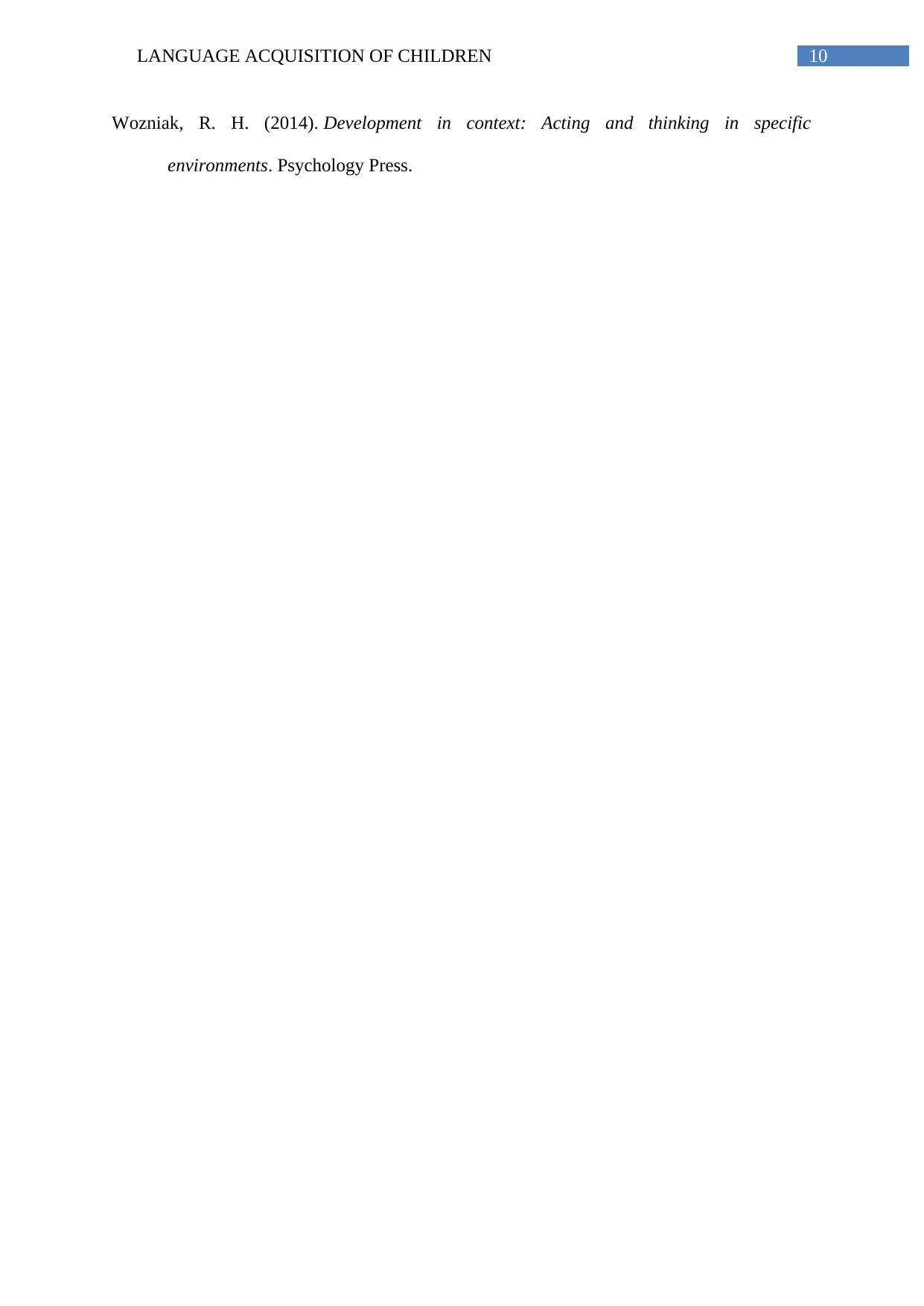
10LANGUAGE ACQUISITION OF CHILDREN
Wozniak, R. H. (2014). Development in context: Acting and thinking in specific
environments. Psychology Press.
Wozniak, R. H. (2014). Development in context: Acting and thinking in specific
environments. Psychology Press.
1 out of 11
Related Documents
Your All-in-One AI-Powered Toolkit for Academic Success.
+13062052269
info@desklib.com
Available 24*7 on WhatsApp / Email
![[object Object]](/_next/static/media/star-bottom.7253800d.svg)
Unlock your academic potential
Copyright © 2020–2026 A2Z Services. All Rights Reserved. Developed and managed by ZUCOL.





